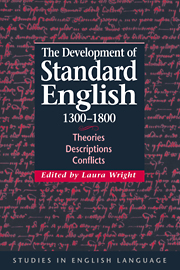Book contents
- Frontmatter
- Contents
- List of contributors
- Acknowledgements
- Introduction
- Part one Theory and methodology: approaches to studying the standardisation of English
- 1 Historical description and the ideology of the standard language
- 2 Mythical strands in the ideology of prescriptivism
- 3 Rats, bats, sparrows and dogs: biology, linguistics and the nature of Standard English
- 4 Salience, stigma and standard
- 5 The ideology of the standard and the development of Extraterritorial Englishes
- 6 Metropolitan values: migration, mobility and cultural norms, London 1100–1700
- Part two Processes of the standardisation of English
- Index
6 - Metropolitan values: migration, mobility and cultural norms, London 1100–1700
Published online by Cambridge University Press: 30 September 2009
- Frontmatter
- Contents
- List of contributors
- Acknowledgements
- Introduction
- Part one Theory and methodology: approaches to studying the standardisation of English
- 1 Historical description and the ideology of the standard language
- 2 Mythical strands in the ideology of prescriptivism
- 3 Rats, bats, sparrows and dogs: biology, linguistics and the nature of Standard English
- 4 Salience, stigma and standard
- 5 The ideology of the standard and the development of Extraterritorial Englishes
- 6 Metropolitan values: migration, mobility and cultural norms, London 1100–1700
- Part two Processes of the standardisation of English
- Index
Summary
Ideas of language entwine with those which shape the identity of peoples, territories, cities and states. Historians of medieval and early modern England have recently made much play with these themes, recognising the complexity of the issues and the fact that appeals to a ‘language’ as a basis for the social or political identity of a group can themselves transcend linguistic diversity. Of all European countries, that of the English is the one with the deepest and most continuous historical roots. Thus notions concerning the English language and the significance of its ‘standard’ forms are deeply embedded in our sense of the past and in our attempts to order the present. In Britain, perhaps more than anywhere else, elements from a carefully constructed history of the nation have been, and are being, used to explain the evolution of the language itself. Thus, technical linguistic explanations of change should be linked to the best possible understanding of the economic, social and political forces which may have influenced it, but should also be aware of the agendas which underlie the writing of the history that they draw upon.
After the Norman Conquest, when the standard language of the Old English state was rejected in favour of Latin and the addition of French made England even more of a multilingual kingdom than it already was, it was recognised that the vernacular comprised many forms of speech which, along with differences in law and custom, marked strong regional cultures.
- Type
- Chapter
- Information
- The Development of Standard English, 1300–1800Theories, Descriptions, Conflicts, pp. 93 - 114Publisher: Cambridge University PressPrint publication year: 2000
- 15
- Cited by



